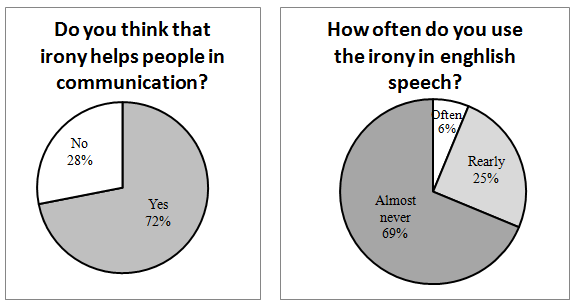 Файль Екатерина Владимировна,
Файль Екатерина Владимировна,
ОмГУ им. Ф.М. Достоевского
Irony intention, types of irony
The essence of irony consists in moving on the first plan not of the logical but of the evaluative meaning. So, Irony is a stylistic device in which the contextual evaluative meaning of a word is directly opposite to its dictionary meaning.
The context is arranged so that the some word in irony reverses the direction of the evaluation and a positive meaning is understood as a negative one and conversely. For example, “She turned with the sweet smile of an alligator”. The word “sweet” reverse their positive meaning into the negative one due to the context. So, irony does not exist outside the context.
There are three types of irony: verbal irony, sustained irony and dramatic irony.
In the stylistic devise of verbal irony it is always possible to indicate the exact word whose contextual meaning diametrically opposes its dictionary meaning. Here are some examples of verbal irony: clear like mud, as sunny as day in winter in Alaska.
And we deal with sustained irony when it is not possible to indicate such exact word and the effect of irony is created by number of statements by the whole text. This type of irony is formed by the contrast of the speaker’s or writer’s considerations and the generally accepted moral views. Situational irony take place when something completely different from what is expected to happen. It's the most well-known definition of irony. For example, “The news stories told of how
Officer Jackson died in a shootout the other day. All the bullets had missed him, but he had suffered a heart attack from the stress”. Irony can be funny, but it does not have to be: “Always remember that you are absolutely unique. Just like everyone else.” Margaret Mead.
Dramatic irony is a stylistic device that is most usually used by storytellers, in plays, in the theater, and in movies. The irony is used as a plot device to create situations where the reader knows much more about the episodes and the resolutions before the chief character or characters. For example, the reader may be already aware that a character is going to be killed, but the particular character and some other characters may not know these facts. The actions and words of characters will therefore mean different things to readers and audiences from what they mean to story and play characters. As a speech device, dramatic irony is used to embellish, emphasize, and to express moods and emotions. For example, at the end of the Shakespearean play Romeo and Juliet, we as the audience know that Juliet only pretended her death to be with Romeo. But, Romeo does not know this, and as such, take a poison.
Irony for breaking the ice and opinion expression
Irony also can help to overcome the communicative barriers between first-meting people or provide positive way for politician or business discussion. “More often, people prefer indirect ways of expression, leaving the colleague the opportunity to think out unsaid” [1. p.267—291.].
Scientists consider irony as a way to raise an authority [3. p.184-194]. Someone, who uses the irony, seems to be witty. Also irony can low an authority, it allows us to express opinion about somebody avoiding calling them. For example, “We need a president who is fluent in at least one language.” Buck Henry. It lowers the authority of George. W. Bush, though not to be named. The speech of the US ex-president famous for a lot of mistakes.
Research section
We have made a research in order to find out the opinion about using the irony in speech. Forty five students have interviewed according to these questions:
- Do you think that irony helps people in communication?
- How often do you use the irony in speech?
- If you don’t use the irony in speech, that is the reason?
Results of research are given in Picture 1.

Picture1. Results of research.
We discover that absolute majority of students believe that irony facilitate a communication, but don’t use it in English speech. The most often reason is that students don’t know how to use it, especially the verbal irony. Students avoid using the irony, because they fear to be misunderstood.
We came to the conclusion that students should be encouraged to use the irony. It will make their English speech much fluent and bright.
Irony is uses in different languages, so that we convinced that when irony will be put into practice, it will be easily for people all over the world to understand each other.
Bibliographic reference.
- Bach K. Semantic Slack: What is said and More // Foundations of Speech Act Theory / ed. by L. Tsohatzidis. — L. : Routledge, 1994. P. 267—291.
- Shilikhina K.M. “Irony in political dialogue” (Political discourse) Voronezh, Russia
- Shilihina K.M. The series "Aspects of language and communication." Issue 4. - Voronezh: Voronezh State University; Publishing house Aleynikov, 2008. - p.184-194.
- http://theoatmeal.com/comics/irony
